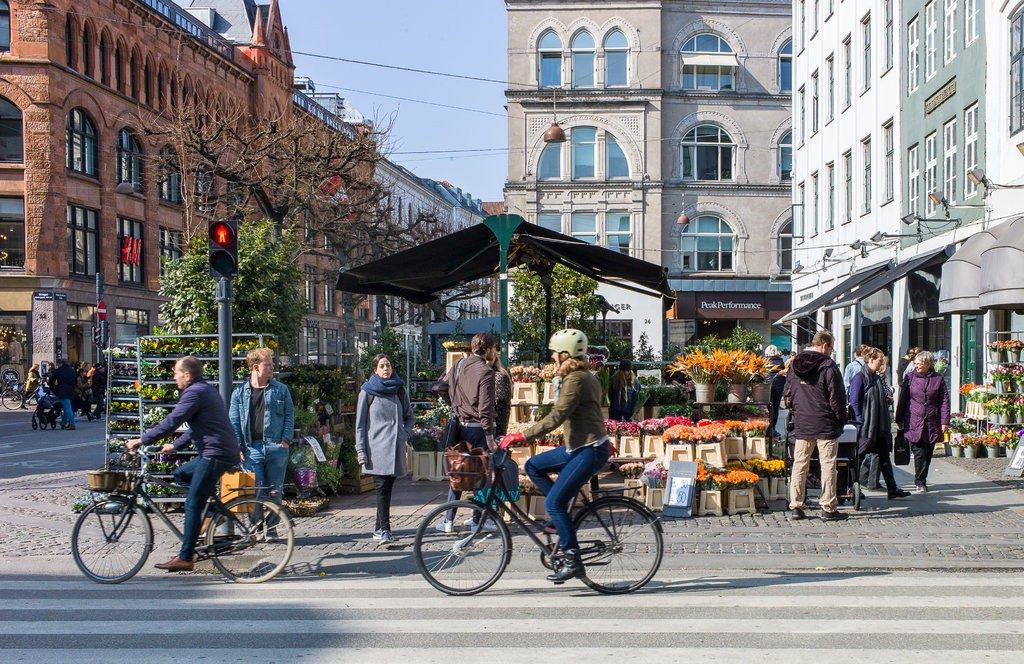Something Not Rotten in Denmark
NOBEL LAUREATES, 20 Aug 2018
Paul Krugman – The New York Times

Danes tend to be happier than Americans and find life more satisfying.
Credit: Jane Beiles for The New York Times
16 Aug 2018 – To be or not to be a socialist hellhole, that is the question. Sorry, I couldn’t help myself.
Last weekend, Trish Regan, a Fox Business host, created a bit of an international incident by describing Denmark as an example of the horrors of socialism, right along with Venezuela. Denmark’s finance minister suggested that she visit his country and learn some facts.
Indeed, Regan couldn’t have picked a worse example — or, from the point of view of U.S. progressives, a better one.
For Denmark has indeed taken a very different path from the United States over the past few decades, veering (modestly) to the left where we’ve veered right. And it has done just fine.
American politics has been dominated by a crusade against big government; Denmark has embraced an expansive government role, with public spending more than half of G.D.P. American politicians fear talk about redistribution of income from the rich to the less well-off; Denmark engages in such redistribution on a scale unimaginable here. American policy has been increasingly hostile to organized labor, and unions have virtually disappeared from the private sector; two-thirds of Danish workers are unionized.
Conservative ideology says that Denmark’s policy choices should be disastrous, that grass should be growing in the streets of Copenhagen. Regan was, in effect, describing what her employers think must be happening there. But if Denmark is a hellhole, it’s doing a very good job of hiding that fact: I was just there, and it looks awfully prosperous.
And the data agree with that impression. Danes are more likely to have jobs than Americans, and in many cases they earn substantially more. Overall G.D.P. per capita in Denmark is a bit lower than in America, but that’s basically because the Danes take more vacations. Income inequality is much lower, and life expectancy is higher.
The simple fact is that life is better for most Danes than it is for their U.S. counterparts. There’s a reason Denmark consistently ranks well ahead of America in measures of happiness and life satisfaction.
But is Denmark socialist?
The libertarian Cato Institute says no: “Denmark has quite a free-market economy, apart from its welfare state transfers and high government consumption.” That’s some qualification.
It’s true that Denmark doesn’t at all fit the classic definition of socialism, which involves government ownership of the means of production. It is, instead, social-democratic: a market economy where the downsides of capitalism are mitigated by government action, including a very strong social safety net.
But U.S. conservatives — like Fox’s Regan — continually and systematically blur the distinction between social democracy and socialism. In 2008, John McCain accused Barack Obama of wanting socialism, basically because Obama called for an expansion of health coverage. In 2012, Mitt Romney declared that Obama got his ideas from “socialist democrats in Europe.”
In other words, in American political discourse, anyone who wants to make life in a market economy less nasty, brutish and short gets denounced as a socialist.
And this smear campaign has had a predictable effect: Sooner or later, if you call any attempt to improve American lives “socialism,” a lot of people will conclude that socialism is O.K.
A recent Gallup poll found that majorities both of young voters and of self-identified Democrats prefer socialism to capitalism. But this doesn’t mean that tens of millions of Americans want the government to seize the economy’s commanding heights. It just means that many people, told that wanting America to be a bit more like Denmark is socialist, end up believing that socialism isn’t so bad, after all.
The same may be said for some Democratic politicians. Much has been made of Alexandria Ocasio-Cortez, not just because of her upset primary victory, but because she’s a self-proclaimed socialist. Her platform, however, isn’t socialist at all by the traditional definition. It’s just unabashedly social-democratic.
And that puts her in line with the rest of her party. Whenever I read articles questioning what Democrats stand for, I wonder if the writers are paying any attention to what candidates are saying about policy. For today’s Democratic Party is actually impressively unified around social-democratic goals, far more so than in the past.
True, there are differences over both policy and rhetorical strategy. Should the push for universal health coverage involve Medicare for all, or simply the right for everyone to buy into an enhanced Medicare program? Should Democrats simply ignore Republican slander of their social-democratic ideas, or should they try to turn the “socialist” smear into a badge of honor?
But these aren’t very deep divisions, certainly nothing like the divisions between liberals and centrists that wracked the party a couple of decades ago.
The simple fact is that there is far more misery in America than there needs to be. Every other advanced country has universal health care and a much stronger social safety net than we do. And it doesn’t have to be that way.
_______________________________________________________
 Paul Krugman received the 2008 Nobel Prize in Economics. He joined The New York Times in 1999 as a columnist on the Op-Ed Page and continues as professor of Economics and International Affairs at Princeton University. He has taught at Yale, MIT and Stanford. He is the author or editor of 20 books and more than 200 papers in professional journals and edited volumes.
Paul Krugman received the 2008 Nobel Prize in Economics. He joined The New York Times in 1999 as a columnist on the Op-Ed Page and continues as professor of Economics and International Affairs at Princeton University. He has taught at Yale, MIT and Stanford. He is the author or editor of 20 books and more than 200 papers in professional journals and edited volumes.
A version of this article appears in print on Aug. 17, 2018, on Page A27 of the New York edition with the headline: Something Not Rotten In Denmark.
DISCLAIMER: The statements, views and opinions expressed in pieces republished here are solely those of the authors and do not necessarily represent those of TMS. In accordance with title 17 U.S.C. section 107, this material is distributed without profit to those who have expressed a prior interest in receiving the included information for research and educational purposes. TMS has no affiliation whatsoever with the originator of this article nor is TMS endorsed or sponsored by the originator. “GO TO ORIGINAL” links are provided as a convenience to our readers and allow for verification of authenticity. However, as originating pages are often updated by their originating host sites, the versions posted may not match the versions our readers view when clicking the “GO TO ORIGINAL” links. This site contains copyrighted material the use of which has not always been specifically authorized by the copyright owner. We are making such material available in our efforts to advance understanding of environmental, political, human rights, economic, democracy, scientific, and social justice issues, etc. We believe this constitutes a ‘fair use’ of any such copyrighted material as provided for in section 107 of the US Copyright Law. In accordance with Title 17 U.S.C. Section 107, the material on this site is distributed without profit to those who have expressed a prior interest in receiving the included information for research and educational purposes. For more information go to: http://www.law.cornell.edu/uscode/17/107.shtml. If you wish to use copyrighted material from this site for purposes of your own that go beyond ‘fair use’, you must obtain permission from the copyright owner.
(My comments on economist/NY Times columnist Paul Krugman’s recent piece on Denmark, socialism, etc. were posted at the NY Times shortly after Krugman’s article appeared there; I believe they are apropos for the venerable TMS site, also.)–G.C.
“Mr. Krugman makes some fine points here, but he does gloss over the key issue. The glossing occurs when he distinguishes between “socialists” and “social-democrats.” Yes, there’s a big difference there–but, why are Americans so careless about making distinctions?
“While Mr. Krugman notes the “happiness index” being considerably higher in Denmark than in the U.S., as well as higher union participation and much better health care options, he fails to give ample notice to the pathetic state of education in the U.S.
“From first grade through graduate school, Americans are trained to think within boxes of orthodoxies; i.e., trained in “what” to think, not “how.”
“Of course, our media is complicit in that poor and misleading “education.” Decades ago, Marshall McLuhan wrote that “the medium is the message.” “Medium cool” was a catchphrase of the era. The idea was that we were losing ourselves in our media because they were “cool” or comfortable places to “hang out.”
“That was then, and this is now. Our media are not very “cool” now! We hear harangues from so-called “newscasters” and “reporters” who are actually commentators. And, of course, we have a plethora of self-appointed “experts” and “analysts” on our not-very-“social” media!
“‘Where is wisdom to be found?'” the Good Book asks (when it’s at its best!). “Average” Danes are much better educated than “average” Americans. They have participatory democracy; we have clichés and shaming of those who disagree with us.”